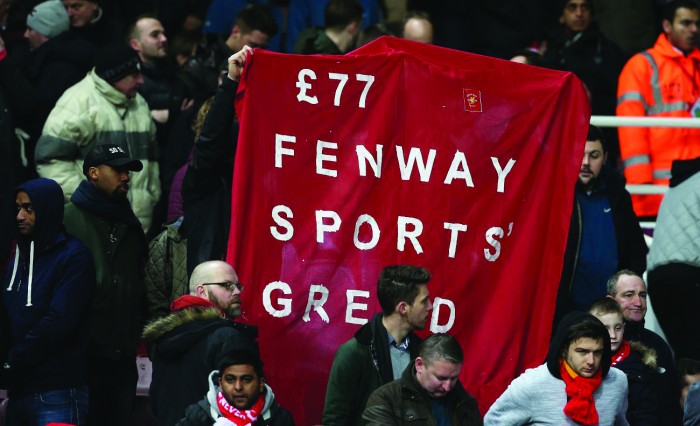The essence of fandom is hard to capture in words; fans tend to have a more familial connection to their favourite team than to other organizations or businesses. The emotions they invest into sports transcend those of any other service that is provided to the common person. Yet, the reality is that every sports team is still a profit-generating business. Unfortunately, most sports fans have limited budgets, so when local sports teams try to incorporate greater profit margins into their business model, the reaction from fans is as expressive as it is swift.
Famed football club Liverpool FC experienced this situation firsthand when they tried to raise ticket prices and institute new price regulations at their home field Anfield Stadium. Almost 10,000 fans left Anfield during the 77th minute of a match on Feb. 6, with chants such as “You greedy bastards, enough is enough.” This stunning demonstration led to rapid discussions between the Boston- based owner—Fenway Sports Group—and senior management at Liverpool. They decided to cancel their price inflations and also issued a public apology to all their fans.
In response to the controversy, representatives from Spion Kop 1906 and Spirit of Shankly, two of the supporters groups that organized the demonstrations, released the following statement: “More must be done to make football affordable; however, we have always stated that this is a journey that the owners should embark upon, and this is a positive step in the right direction towards fairness and away from greed, but it is only one step.”
Liverpool management came to the realization that devout fans expect to be treated with the respect that they have shown to their club for decades, even though the demand for tickets at famed soccer clubs is relatively inelastic. This is a reality for many sports clubs with passionate fans, including FC Barcelona, Green Bay Packers, Chicago Cubs, and so on. The sports world is as lucrative as it has ever been. Reflected by rising salary caps, new television deals, and bigger contracts, the common fan does not expect to shoulder a heavier financial burn.
Many cities gain recognition on a national and international level because of their sports teams. Fans are a huge part of the esteem and pride surrounding these organizations, and they are the people who spend their hard-earned money on team gear, memorabilia, and tickets. They are the driving force behind the companies and they do it gleefully, as long as they feel that they aren’t being explicitly manipulated or taken advantage of. When that does occur, fan reaction is deservedly harsh because they are the reason that the team, owner, players, and management all make millions of dollars.
Any claims by teams that they are not making desired profits should be aimed towards the league itself for poor stadium infrastructure, because even with inflation over the years, ticket prices have still increased exponentially. Teams looking to maximize economic profit cannot discount the unique role of fans as more than a customer, and instead an emotionally invested family member. In the end, it takes more than money to represent how much a sports organization means to people, and that love and passion for these teams should not be exploited.









